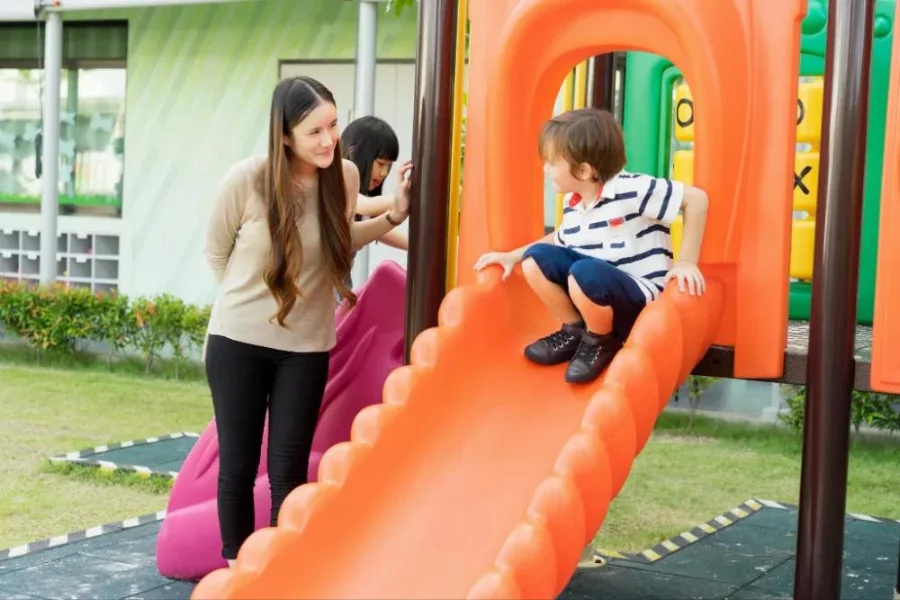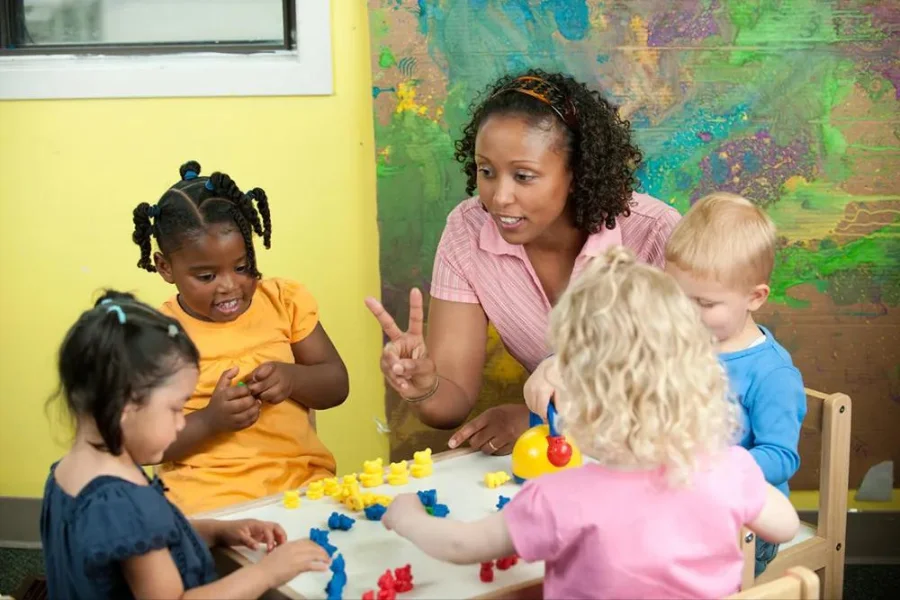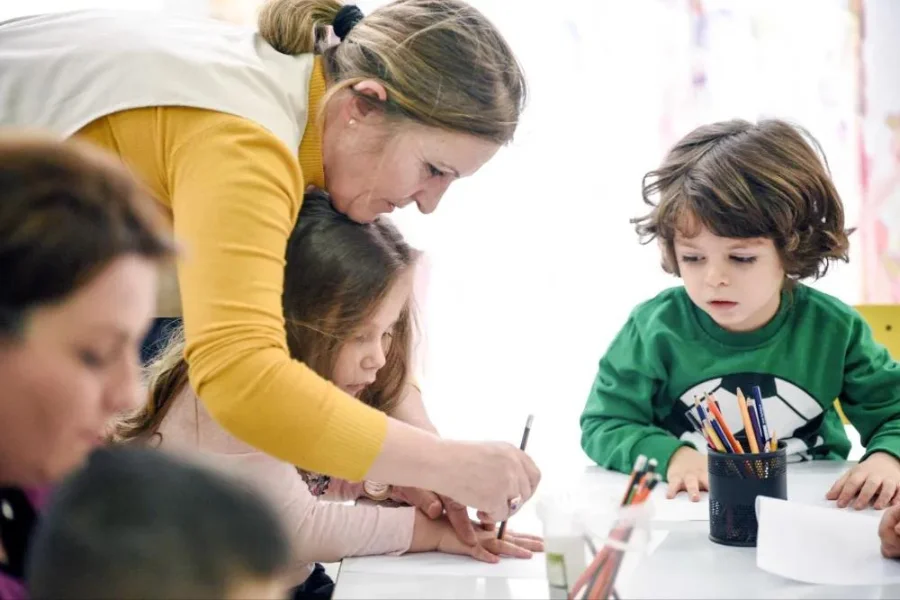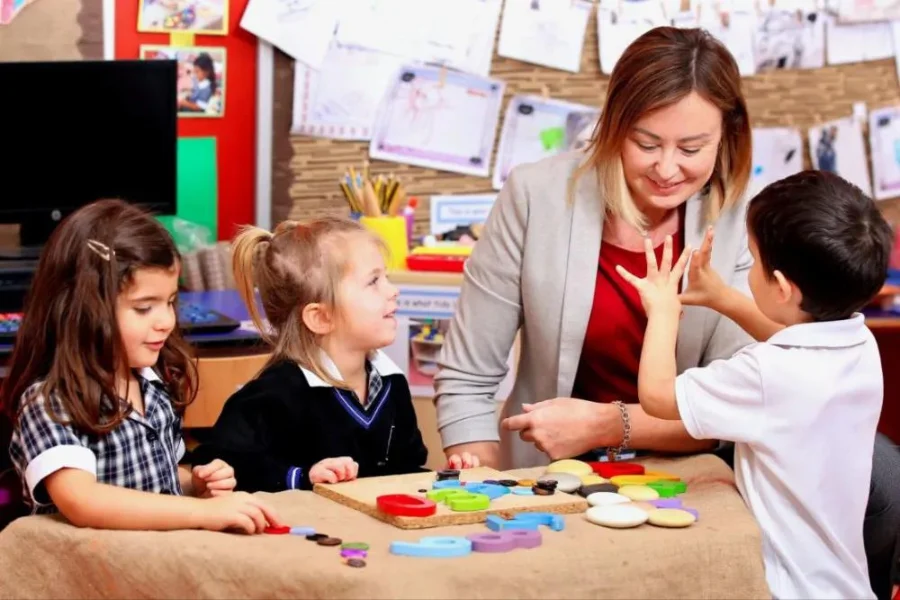Teaching Techniques for Preschoolers

Source: laparent
Teaching Techniques for Preschoolers
Teaching pre-schoolers is a challenging journey filled with unique challenges and rewards.
Knowing the low attention span of the preschoolers teachers leave no stone unturned to make sure that their children pay their undivided attention to the teacher. Therefore, teachers are always on the lookout for knowledge of effective teaching techniques for Pre-schoolers that ensure better learning outcomes for them. Teaching techniques for pre-schoolers are also significant for Parents who can provide the right learning experiences to the child helping them grow and thrive naturally in an organic study atmosphere.
A variety of teaching strategies have evolved over the years which include a host of interactive simple games, storytelling, rhymes, and outdoor exploring that give a boost to the cognitive skills of a child. Each of these techniques is unique and helps to foster the different arenas of a child’s holistic development and guide them through these developmental years.
Table of Content
Teaching pre-schoolers needs a unique mixture of strategies that provide their developmental stages. The following are ten teaching techniques for pre-schoolers, each explained in detail with examples to provide a clear understanding of how to implement them effectively.

Source: developingchild
Storytelling and Role Play
Storytelling is a powerful teaching technique for pre-schoolers. It captures their imagination and helps in language development. For example, reading a story about animals and then motivating the students to act out the roles of different animals boosts their understanding and memory. Role play helps in developing social skills and emotional understanding.
Storytelling and Roleplay are key strategies that help improve learning outcomes in an unconventional mode.
Hands-On Learning
Pre-schoolers learn best through experiences. Practical learning activities like clay modeling, painting, or building blocks allow students to explore and understand the world around them. For example, using building blocks to make simple structures instructs them about shapes, balance, and coordination.
Music and Movement
Integrating music and movement into the syllabus is an outstanding teaching technique for pre-schoolers. Songs through actions, such as ‘The Hokey Pokey,’ teach body awareness and coordination. Music and dance lectures can also be used to teach topics like counting, colors, and more.
Interactive Games
Games that require interaction are perfect for keeping pre-schoolers engaged. Simple Interactive games like ‘Simon Says’ or ‘Duck, Duck, Goose’ teach them to follow guidelines and improve their listening skills, along with being fun and tangibly active.
Art and Craft Activities
Art and craft activities inspire creativity and fine motor skills. Activities like cutting shapes from colored paper and sticking them to make a collection are not only engaging but also improve their hand-eye coordination and identification of shapes and colors.
To join Pre Primary Teacher courses, call on +919869546913 / +919869866277.
Click here for your brochure!

Source: unicef
Nature Exploration
Learning outdoors in a natural setting is a beneficial teaching technique for pre-schoolers. Activities like a nature walk, where students can collect leaves, stones, and other natural items, help them learn about nature and encourage their senses. Nature exploration helps children explore their innate desire to learn and find answers to their new ending questions.
Group Discussions and Collaborative Activities
Encouraging group discussions and collaborative activities develops social skills and teamwork. Simple group tasks like building a large puzzle together or a group storytelling session where each child adds a sentence to the story can be very effective.
Sensory Play
Sensory play is critical for pre-schoolers development. Activities including as playing with sand, water, or play dough give concrete sensations that are essential for their sensory development. For example, playing with sand can be an opportunity to teach about textures, quantities (more or less), and even basic physics (how sand moves and behaves).
Use of Technology
In moderation, technology may be an effective educational tool. Educational applications and interactive games can help to highlight what students learn in class. For example, an app that teaches shapes and colours through interactive games is an effective way to reinforce these concepts. Use of Technology adds a sense of wonder and amazement for little ones enabling teachers to hold on to the child’s attention for a longer while.
Positive Reinforcement
Positive reinforcement is a key teaching technique for pre-schoolers. Admiring children’s efforts and activities, no matter how minor boosts their self-confidence and motivates them to keep trying and learning. For example, a simple “Good job!” or a sticker for a job well done might have a significant impact.
Finally, these teaching techniques for pre-schoolers are designed to interest students in a variety of ways while also meeting their developmental requirements and learning styles. Using these techniques, instructors may create a dynamic and successful learning environment for their young children.
To join Pre Primary Teacher courses, call on +919869546913 / +919869866277.
Click here for your brochure!

Source: brightoncollege
Course for Pre Primary Teacher
Are you ambitious about developing young brains and want to work in early childhood education? Vidhyanidhi Education Society (Govt. Regd.) offers a Course for pre-primary Teacher that will prepare you to become a qualified pre-primary educator. This syllabus is carefully designed to provide you with effective teaching techniques for pre-schoolers, make sure you are well-prepared for the dynamic profession of early childhood education.
Let us explore the unique benefits of this course:
Entire Course Online / Distance
Flexibility and Convenience
The Course for Pre Primary Teacher is entirely available online or through distance learning. This mode is extremely beneficial considering the convenience it offers the trainees to pursue the course at an manageable pace
Accessibility
One can enroll in this course despite their demographic location.This feature is mainly helpful for students existing in distant areas or those w.ith mobility limits.
Resource-Rich Learning Environment
Online and remote learning modes are structured with a variety of digital materials, including co-operative modules, video lectures, and e-books, all of which are intended to advance the understanding of teaching techniques for pre-schoolers.
No Examinations
Stress-Free Learning
The absence of traditional examinations in the Course for Pre Primary Teacher reduces the pressure often associated with rote learning and memorization. This approach fosters a deeper understanding and practical application of teaching techniques for preschoolers.
Focus on Practical Knowledge
By removing the examination component, the course emphasizes practical skills and real-world applicability, crucial for effective preschool teaching.
Assignment-Based Evaluation
Real-World Application
Assignments challenge you to use teaching techniques for pre-schoolers in real-world circumstances, so increasing your problem-solving and critical thinking abilities.
Continuous Feedback
Through assignments, you receive regular feedback from qualified teachers, allowing you to improve your teaching methods and approaches.
Designated Course Coordinator for Thorough Guidance
Personalized Support
A designated course faculty ensures you receive personalized attention and support during your learning journey.
Expert Guidance
The coordinators, with their massive experience in early childhood education, provide valuable resources into modern teaching techniques for preschoolers, helping you become a skilled pre-primary teacher.
Certificate Without Online/Distance Mode Mention
Professional Credibility
Upon completion of the Course for Pre Primary Teacher, you receive a certificate that holds equal weight as any traditional in-person course. The term “Online/Distance mode of study” is not mentioned on the certificate, ensuring your qualification is viewed with the respect it deserves.
Joining the Course for Pre Primary Teacher at Vidhyanidhi Education Society (Govt. regd.) is a step toward a fulfilling career in pre-primary education. This program not only trains you with the current teaching techniques for preschoolers but also provides a learning experience that is flexible, practical, and supported by expert leadership. Embrace this opportunity to nurture young minds and shape the future of education.
Teaching Techniques for Preschoolers
Join VES now—where teaching preschoolers becomes your inspiring journey!
To join Pre Primary Teacher courses, call on +919869546913 / +919869866277.
Click here for your brochure!
FAQs
What Qualifications do you need to open a Preschool?
To open a preschool, you usually require a graduate degree in Early Childhood Education or a related field, additionally appropriate experience.
What is Qualification for Pre Primary Teacher?
Qualifications for a Pre Primary Teacher include acquiring certification like ECCE, NTT, and MTT, often requiring 10+2 education as a minimum.
Can I be A Preschool Teacher without a Degree?
Yes, you can be a playgroup educator without a degree. After completing the 12th, you can pursue specific teacher training courses from reliable Institutions like VES.




